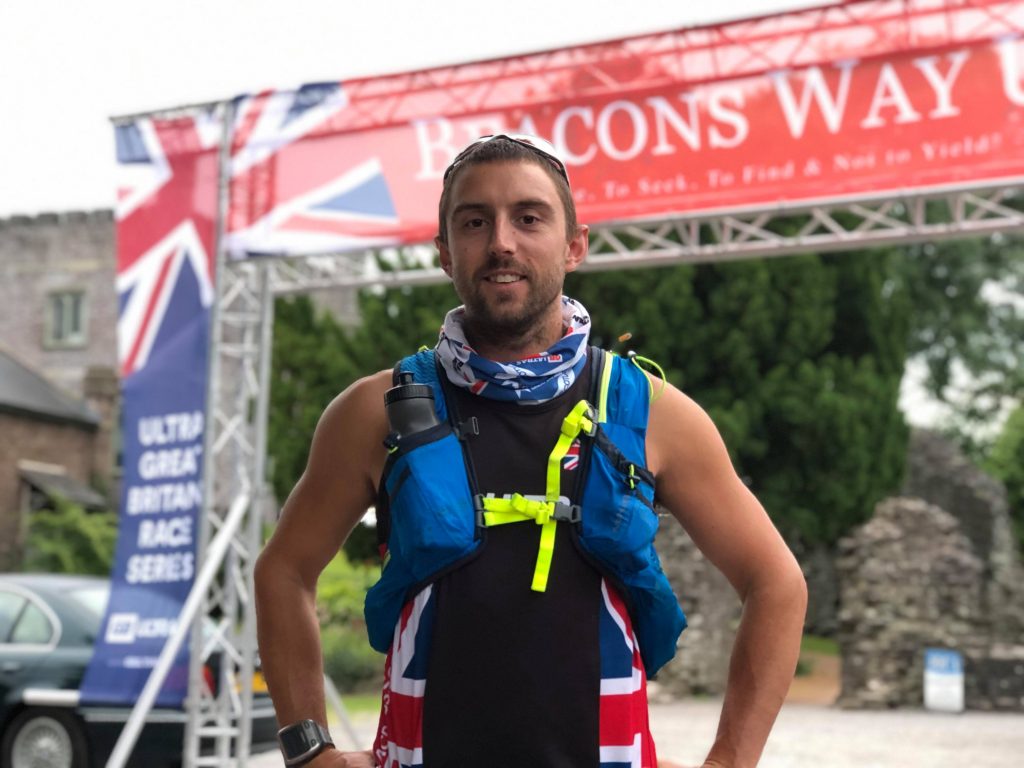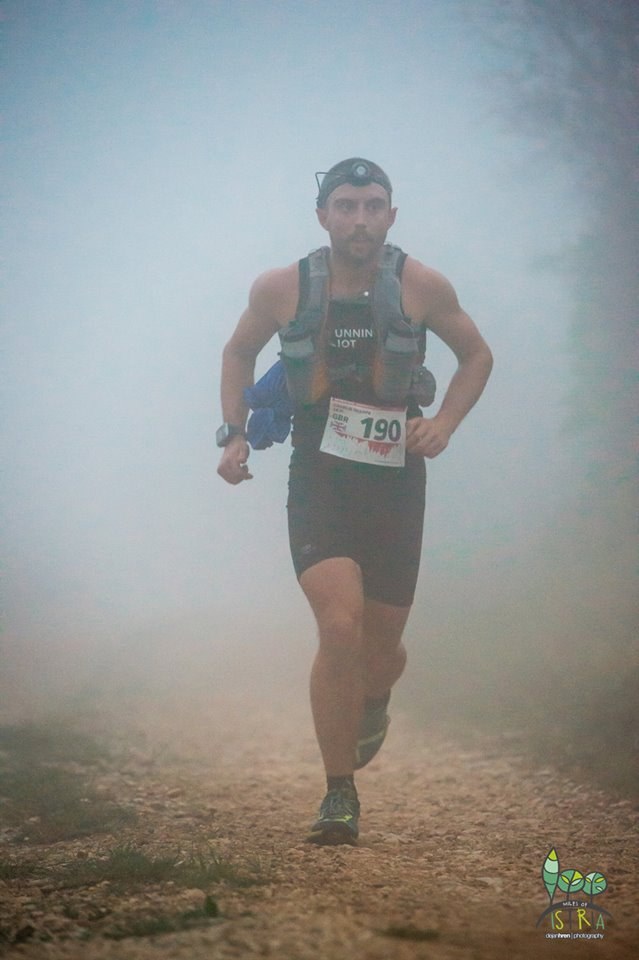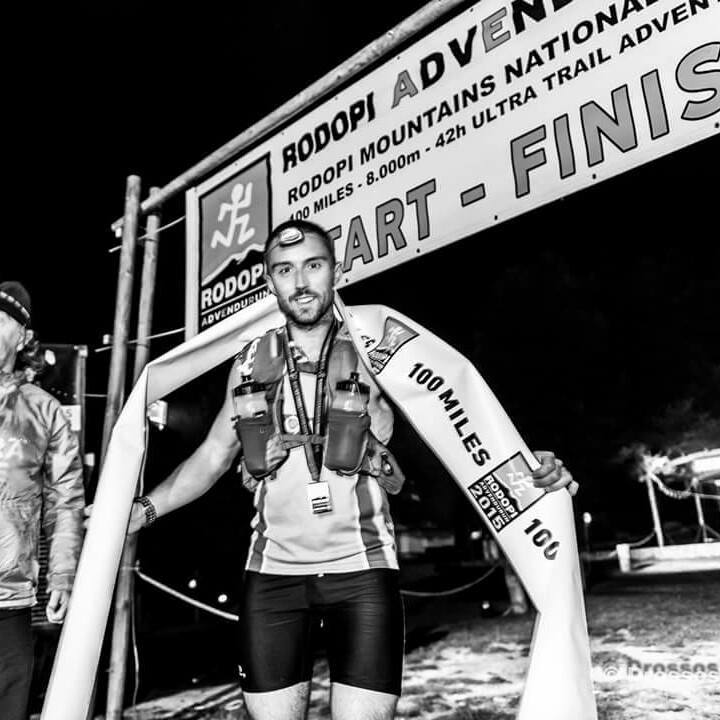My first running race was the 150 mile multi stage, Gobi Challenge race in 2010, similar idea to the Marathon des Sables just a different organisation and different desert. I was probably one of the least experienced entrants and didn’t really run much before that (it was my first running event)
I had practised doing long 2-3 day hikes on tough ground carrying my pack along with strength training for my legs on top of the rock climbing I used to do. I was mid pack and I had to really work for that finish medal. I never really considered finishing position or time I was focused purely on the simple strategy of keep moving and be quick at checkpoints whilst taking in food and drink every 20 to 30 mins.

Now I’ve completed over 100 ultras in all kinds of terrains and distances. My best result being 13 hour 58 min 100 mile time I did in 2017 along with a 5 hour 58 minute 50 mile time in the build up. I actually train predominantly for running now whereas my first few running events I was just curious as to whether my heavy and unfit body could get around these distances, now I like to push for the best time I feel I can achieve.
I’m often asked about a typical training week and whilst it varies depending on the event I’m training for a heavy week when training for a mountainous ultra could be from 80 upto 120 miles taking in 10000 to 12000m of ascent. The lowest mileage I tend to do in a week might be 50 to 60 if I’m tapering or recovering from a big race.
For the 100 mile Personal Best I was doing 2 marathons each weekend for 6 weeks and running them in the 2 hour 40’s to low 3 hours depending on terrain and then I did a 50 mile race about 6 weeks out and a 100km race about 4 weeks out on top of the weekday runs.
I will do 3 or 4 sessions on either conditioning or mobility again depending on the time of year to keep everything in good alignment and make sure my body is moving well. I do sometimes cycle but nothing serious plus 2 to 3 rock climbing sessions and that’s my typical week.
So the big question is what should you do and how is this useful for you?
Some questions to ask to help you focus your training time effectively and best prepare for your upcoming race…
What is your aim within the race?
Where are you at right now?
What strengths do you have that you can apply?
What areas do you need to improve before the race?
Essentially you need to define your areas of weakness and figure out what might be holding you back from finishing the target race. Get used to the kit you plan to use, practice with it and refine it as you go through the training, consider your fuelling strategy, get some long days out in the hills to experience the terrain, I think a night run is worthwhile before the likes of a 100 miler as that can be a real experience too. Also someone who has been crushing loads of fast miles on the road wont necessarily be in a good position for an event in the mountains try and keep your training relevant.

In terms of getting your body ready for the event which I’m covering in this article here’s the process I’d go through.
1 – Assess running form and technique
See what your technique and form is like when running. If your technique is very poor then any training you do will stress the body more than necessary. Similar to driving around with your brakes partially on in the car. I don’t think there is one global running style that suits everyone but it makes sense to make some small tweaks. If there was something simple to at least keep you upright and more relaxed for example, keeping your eyes up and looking a few steps ahead rather than looking straight down to the floor when you’re on runnable sections or keeping your cadence up when ascending and reducing your stride length, perhaps becoming more aware of your foot placement when descending, landing with your weight over your foot rather than your foot being far ahead. These findings could help improve your running without having to add to your training time. Also if you can place less stress on the body that’s great to reduce the chance of an overuse injury.
2 – Define any weaknesses or imbalances.
If you’ve got a problem area that keeps causing issues, maybe preventing you from training or maybe just something a bit stiff or niggle-y, it’s worth seeing someone who knows what they are looking for and getting help fixing it. It could be that the ITB keeps bothering you causing some pain, or an aching hip that comes back when you increase your mileage. Simply stretching and massaging something that constantly bothers you is only a temporary fix. Find out why that’s happening and learn what you can do to get the body in good alignment.
Most of the non running training I do when racing a lot is keeping things mobile and ensuring that my body is working smoothly and in good alignment. Again it’s a way of reducing the stress on the body, you might be strong enough to get through 40 – 60 miles a week without any pain but perhaps some tightness, consider the race length much longer than this, it’s difficult to mask an area that’s hurting for that long. Worse still you could end up putting more stress on to a different area of the body in order to compensate causing a chain of issues.

3 – Build your training up gradually!
I know, I know, ground breaking statement right?! Not really, whilst we all know someone who just went out and started running and did their first ultra with no training. I’ve not seen anyone come up with the magic number of miles to train per week or month. The nature of ultra running means some long days out. Over the past few years I’ve used back to back long runs regularly in my training and since I started them, my stamina in ultras has grown and grown. It depends where you’re at right now but you might start going out for an easy paced hour the day after a marathon that you ran at a comfortable pace. If you’re planning on entering an ultra then it’s likely you’ve already got some sort of base of running or hiking fitness (unless you’re like me). I used some of the national trails in New Zealand to hike over a couple of days as part of my training for my first stage race. I learned a lot!
4 – Practice makes perfect?
Providing you practice something specific and useful to the race of course! Can you switch some of your runs and include more running on hilly or rough terrain if your upcoming race is in the mountains? Squeeze in a few trips to the hills to recce the area of the race? It doesn’t have to be every run. Once a week near where I live I can drive 30 mins to some small hills and if I really try I can get over 500m of ascent in a couple of hours. Nothing much but making the most of what’s available! The weekends I try to get to somewhere like Snowdonia to train on some real hills or do a race (generally I pick the hillier ones) but the rest of the week days I have to make do with either flat road or canal path type trail. I can use these days to either work on my speed or recover either with easy running or some cycling.
In summary.
First get to grips with where you honestly and realistically are, right now. Ask yourself what areas will be holding you back the most. Weight, navigation skills, stamina, confidence, knowledge, technique etc
Now it’s time to make some decisions…. Decide which area will have the biggest impact on you and set to work improving that aspect first. Find someone who can help you. This will save you months or years of trial and error, just because someone has done a few races doesn’t mean that they know what’s best for you either. I’ve seen some crazy advice offered around and about on internet groups and in clubs. Your friends mums taxi driver who was ‘reet good at cross country at school’ might not be your best bet! It could be a physio, coach, navigation expert, past competitor or something totally different.
Breakdown and list the steps between where you are now and where you want to be and then….
DO SOMETHING STRAIGHT AWAY. Sitting there all motivated is great but wont get you through it alone! Start doing something right away that will help you toward that finish line!
Be consistent, keep focused and listen to the body.
There is a whole range of free training advice, videos, live Q&A’s and articles over on my website www.runningriotcoaching.co.uk I also regularly post on the various social media platforms with tips to keep you going.
Over and out
#GBUltras Sponsored Athlete & Ultra-Running Coach
Charlie Sharpe
www.GBUltras.com




